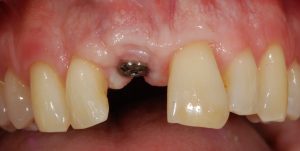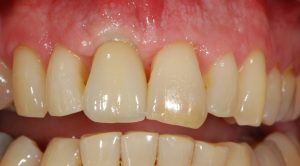Dr. Natalie Mackintosh
– Consulting Dentist –
Dr. Natalie graduated from the University of Queensland with First Class Honours in 2005, alongside Dr. Dominika. Natalie began practicing in conjunction with the team at Kenmore Dental Centre in 2014. She has also practiced in Mackay and Townsville, where she has been fortunate to work under specialist Prosthodontists. Natalie has a keen interest in all aspects of general and family dentistry, and is a kind and caring dentist who is dedicated to providing dental care at the highest standard to all patients that see her. Her patients appreciate her thorough and gentle nature, as well as her meticulous approach to their individual needs and concerns.
Outside of work, Natalie is a lover of fine food and wine. She enjoys spending time with her husband and her three young daughters, and is always up for playing a board game or two!
Dr. Natalie is welcoming new and existing patients of the practice for appointments on a Wednesday or Thursday.

General / Restorative Dentistry
Restorative dentistry involves restoring lost function, restoring lost tooth structure and restoring health. At Kenmore Dental Centre, we utilise the latest 3D intraoral scanning and digital smile design software to achieve the most predictable, functional and esthetic results possible.
Teeth can be damaged for a variety of reasons such as dental decay, trauma/accidents, grinding/wear and acid erosion. If teeth become too damaged to restore, tooth loss can cause greater loads on the remaining teeth meaning they are more likely to be lost in the future. Common treatments for restoring function are fillings, dental crowns, dental bridges, dental inlays and onlays and dental implants.
When only a small amount of tooth structure is lost, it can be replaced with a composite resin filling (white filling). These restorations can work very well if the tooth still has a lot of structural integrity. For a tooth that is more severely compromised (large cavities, prior root canal treatment or cracked teeth) a crown may be required to ensure the longevity of the tooth. Essentially, a crown is like a “cap” that is custom made to fit over the top of your tooth, stopping any further breakdown. There are a number of different materials that may be used and your dentist will advise which is best for function and aesthetics in each unique situation. Our dentists work with a dental laboratory technician who hand-makes crowns to achieve the best fit and aesthetic result possible. Dental inlays and onlays are an intermediate solution to reinforce teeth that are halfway between fillings and dental crowns and can be made from gold or porcelain.
Missing teeth can be replaced with a dental bridge or implant. A bridge is a prosthetic device that is anchored to teeth adjacent to a space to replace a missing tooth or teeth. When a lost tooth is replaced with bridgework, the teeth on either side of the missing tooth are prepared as crowns in order to hold the prosthetic in place. Dental implants involve a titanium implant placed into the bone to replace the missing root part of the tooth with a porcelain crown placed on top of it to replace the visible part of the tooth above the gums.
All dental procedures carry risks. The results of these treatment options will vary from patient to patient. Please speak with your dentist for an accurate explanation of what you could expect.
Department of Veterans Affairs (DVA)
We welcome all DVA patients to Kenmore Dental Centre and will provide treatment with no-out of pocket expense.
Child Dental Benefit Scheme (CDBS)
How do I know if we are eligible for the CDBS? If you are eligible you will receive a written notification from the Australian Government from early 2014 on. If you have received your notification from the Australian Government please call our surgery today and we can answer your questions – and more detailed information is available from the Human Services website: http://www.humanservices.gov.au/customer/services/medicare/child-dental-benefits-schedule
What services are covered by the CDBS? The dental services covered include checkups, cleans, x-rays, fillings, fissure seals, extractions, root canal treatment and partial dentures. Services such as orthodontics or cosmetic dentistry are not included and there are limits on certain services.
How long does this $1000 benefit last? The $1000 benefit period commences at the start of the calendar year and can be used over the following 2 years. Any remaining benefit cannot be used past that time nor can it be transferred to any other children.
What if my child needs more treatment than what benefit is available? If this occurs you will need to pay the difference. The dentist will discuss this with you PRIOR to any treatment so you are fully aware.
How do I claim my benefit? To claim under the CDBS at Kenmore Dental Centre, first patients must pay in full for their treatment on the day of the service. A claim to medicare will then be processed immediately (using Medicare Easyclaim) and the money will be reimbursed to your nominated account on the same day as treatment. You will be provided with a treatment plan and quote prior to your appointment.
Orthodontics:
Aligning teeth offers many advantages such as:
- Cosmetic improvement
- Better airway – expanding the dental arches results in improved airway and breathing
- Easier to clean – teeth that are well aligned are easier to keep clean
- Easier to chew and eat all foods
- More balanced bite to protect teeth from destructive/heavy forces
- Correct jaw relationships to protect the health and function of the jaw joint (TMJ)
We offer a wide range of orthodontic services and utilise the latest in digital scanning technology. Why do we use digital scanners? The reason is, scanners enable us to operate more effectively and efficiently when it comes to treating our patients. In most cases, we can avoid taking moulds and are able to adjust your treatment plan in real-time thus responding to the movement of your teeth without affecting their progress.
Invisalign: By using a series of clear, removable aligners, Invisalign straightens your teeth with results you’ll notice sooner than you think. The course of treatment involves changing aligners approximately every two weeks, moving your teeth into straighter position step by step, until you have a more beautiful smile. And unlike braces, these clear aligners can be removed while you eat and brush your teeth as usual. They are far more comfortable than braces, eliminating the pain associated with wire changes in fixed braces. The forces are gentler and kinder to your teeth.
An average Invisalign course of treatment takes about a year. You’ll see your Invisalign Accredited Dentist every 6 to 8 weeks for adjustments and to check progress. At regular intervals, you’ll receive a new set of custom-moulded clear aligners to continue the straightening process. The total number of clear aligners is specific to you, determined by your doctor for your course of treatment.
All dental procedures carry risks. The results of this treatment will vary from patient to patient. Please speak with your dentist for an accurate explanation of what you could expect.
Children’s Dentistry
At Kenmore Dental Centre we offer comprehensive dental care for young children and adolescents in a caring and fun environment. Our oral health therapist and dentists are highly trained to treat children of all ages and are passionate about establishing healthy dental habits so children will be able to keep healthy teeth for life.
At your child’s initial visit with us they will receive a comprehensive examination, including an orthodontic assessment if there are any developmental concerns. X-rays may be required to assess between the teeth and how the teeth are developing, allowing us to look at the full picture.
As we believe prevention is far better than a cure, we normally recommend examinations in either 6 or 12 monthly intervals to ensure your child’s mouth is on track and early problems are dealt with quickly.
We also accept the government Child Dental Benefit Scheme (CDBS).
Missing Teeth:
When a tooth is missing, generally there are four options available: Leaving a gap or space, dentures, dental bridges or dental implants.
Leaving the space: Some people may not be too concerned about replacing a missing tooth at the back of the mouth, as it cannot be seen. However, there are a number of consequences to leaving a gap at the back of the mouth. The teeth on either side or opposing the gap may drift into the space causing food packing, decay and an inharmonious bite. Furthermore, the back teeth are designed for chewing and taking the load of heavy biting forces. If spread over fewer teeth, these forces may result in cracking, wear or movement of the remaining teeth. In this situation, the front teeth may start to bear the heavy biting forces, a role they are not designed to do. This results in splaying (drifting outwards), wear and breakage of the front teeth as a consequence of the loss of back teeth.
Dentures: Dentures are made of either metal or plastic and are used to replace missing teeth. Dentures are removable meaning that they are taken in and out by you. Even the most well fitted dentures will have some movement and will trap food and plaque against any remaining teeth. Partial dentures also put more load on the remaining teeth making them more likely to break and be lost due to excessive loading. The good part about dentures is that while they do not restore function particularly well, in many cases they can cost-effectively restore the appearance of a missing tooth.
Dental Bridges: Dental bridges restore both function (ability to chew, smile, talk) and appearance very well. The down side to dental bridges is that they need to have teeth on either side of the gap to support the additional tooth. This means that you have two teeth now taking the load of three teeth. Dental bridges are a great alternative to replace missing teeth. Dental bridges are fixed in place so cannot be removed by you and feel secure like natural teeth.
Dental Implants: In many cases dental implants are the ideal solution to replace a missing tooth, as they have the least impact on the rest of the mouth and most closely resemble your natural tooth. An implant involves the placement of a titanium “screw” into the jaw bone. Once the implant has healed (or Osseo integrated) a custom-made tooth-coloured crown can then be attached. Several appointments are necessary for the predictable placement and restoration of an Implant and a consultation with our dentists to ensure that this treatment is suitable is the best place to start.
All dental procedures carry risks. The results of these treatment options will vary from patient to patient. Please speak with your dentist for an accurate explanation of what you could expect.

Tooth Whitening
Tooth whitening is a simple, non-invasive dental treatment used to change the colour of natural tooth enamel and is an ideal way to enhance the beauty of your smile.
Before undergoing any whitening procedure, we recommend that you have an up to date dental examination and clean with the hygienist prior to making a decision on which whitening procedure is best suited to you. This ensures that any surface stains are removed prior to whitening and your teeth are in a healthy condition. Since tooth whitening only works on natural tooth enamel, it is important to evaluate the possibility of replacing any old fillings or crowns. Replacement of any restorations will be done after bleaching so they will match the newly whitened teeth.
Take home whitening procedures allow you the convenience of whitening your teeth at home. This procedure involves having a mould taken of your teeth and a custom whitening tray fitted. Specially prescribed whitening gel is then placed within the tray and worn for a short period during the day or overnight while sleeping. Depending on the colour of your teeth, you may need to repeat this process between 3 to 7 times to get the result that you are happy with.
We are also able to whiten your teeth in less than two hours using “Zoom” in chair whitening. This is a great option for people who do not have time to whiten their teeth slowly at home. During this procedure, whitening gel is applied to your teeth and activated with the Zoom Light. We also include a “home” whitening kit so that you may “top up” in the future, allowing you to maintain your lovely white smile.
All dental procedures carry risks. The results of these treatment options will vary from patient to patient. Please speak with your dentist for an accurate explanation of what you could expect.
Root Canal Treatment
The objective of root canal treatment is to save a tooth that has been badly damaged due to decay, disease or injury resulting in the death or infection of the nerve in the tooth. A root canal involves removing the infected nerve from your tooth, cleaning out bacteria in the nerve that are causing you pain and sealing it to prevent re-infection. At Kenmore Dental Centre, we have the latest equipment to make this procedure faster, better and more accurate and painless.
As soon as we mention root canal, the first question we are normally asked is “will it hurt?” However it is actually the INFECTION in the tooth that causes the pain and the root canal is the treatment required to get you out of pain! People who have root canal horror stories often remember the pain from the toothache itself and forget that it was the root canal that got them out of pain. During the procedure you will be completely numb and should not feel any pain. The biggest problem most people have during a root canal procedure is boredom. To help you cope with this we have ceiling mounted TVs that you can watch or you are welcome to bring music/podcasts to listen to.
All dental procedures carry risks. The results of this treatment will vary from patient to patient. Please speak with your dentist for an accurate explanation of what you could expect.
Periodontal (gum) Disease:
Gums are the pink tissue that surrounds the teeth. Periodontal tissue is a ligament that supports and nourishes the tooth from the underlying bone. Both are susceptible to inflammation and infection. In fact, gum and periodontal disease is the most common infection in man, woman or child. Periodontal disease is caused by bacteria in the form of plaque or calculus (calcified plaque). Inflammation of the gums occurs in response to the presence of these bacteria.
Gingivitis is a mild form of gum disease affecting the gum only. It can be reversed with daily brushing and flossing. There is no loss of bone or tissue but the tissues appear red, swollen and may bleed easily. If this is untreated it can advance to periodontitis.
Periodontitis occurs when the inflammation spreads to the underlying supporting structures of the tooth. Bacterial toxins and the bodies inflammatory enzymes fighting the infection actually start to break down the bone and connective tissue that hold teeth in place. If not treated, the bones, gums and connective tissue that support the teeth are destroyed. This is usually relatively painless, and in severe cases the teeth may eventually become loose. Clinical examination and X-rays can be undertaken to identify affected areas.
The presence of inflammation and infection has been shown to contribute to cardiovascular disease, non-insulin dependent diabetes, osteoporosis and low birth-weight babies.
- Risk Factors for periodontal disease:
- Smoking – Smoking is one of the most significant risk factors associated with the development of periodontitis. Additionally, smoking can lower the chances of success of some treatments.
- Diabetes – People with diabetes are at higher risk for developing infections because their bodies are unable to fight infection effectively.
- Medications – Some drugs, such as antidepressants and some heart medicines, can affect oral health because they lessen the flow of saliva. (Saliva has a protective effect on teeth and gums.)
- Illnesses – Diseases like cancer or AIDS and their treatments can also affect the health of gums.
- Genetic susceptibility – Some people are more prone to severe periodontal disease than others. If your parents had problems with tooth loss then there is a greater chance that you will develop periodontitis.
The aim of periodontal treatment is to remove the bacteria causing the inflammation, hence slowing the rate of tissue and bone damage. The dentist, periodontist (gum specialist) or dental hygienist removes the calculus through a deep-cleaning method called scaling and root planing. Scaling means scraping off the tartar from above and below the gum line. Root planing gets rid of rough spots on the tooth root where the germs gather and helps remove bacteria that contribute to the disease. With this reduction in bacteria, the pocket of gum around the tooth hopefully reduces in size to prevent bacteria lying deep in your gums and also to allow a small pocket that can easily be managed at home with effective brushing and flossing.
All dental procedures carry risks. The results of this treatment will vary from patient to patient. Please speak with your dentist for an accurate explanation of what you could expect.
Temperomandibular disorder/dysfunction
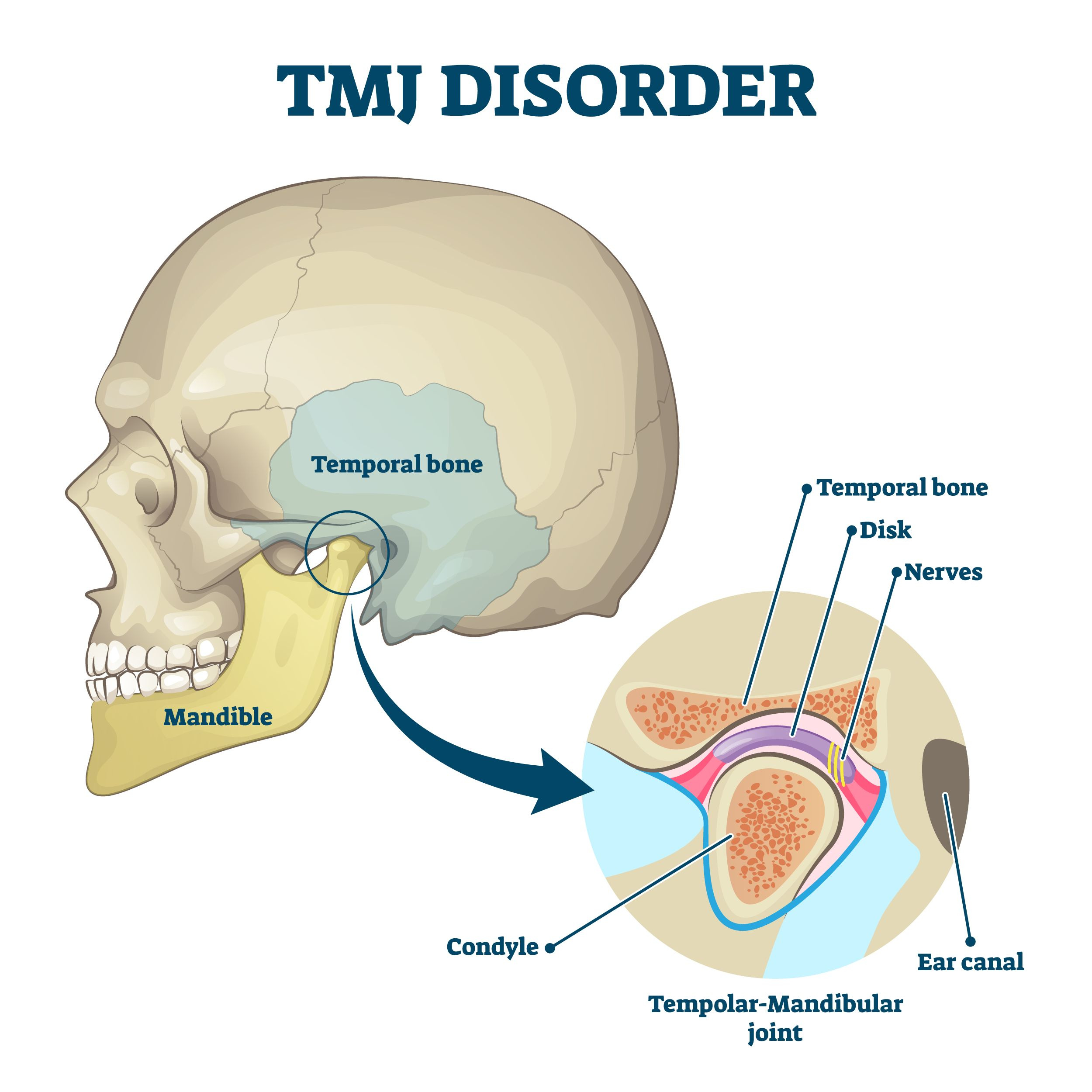
Temporomandibular dysfunction (TMD) encompasses a group of disorders of the masticatory system, broadly divided into muscular conditions and those affecting the temporomandibular joint (TMJ). TMD is a common condition, signs of which appear in up to 60–70% of the population.
The aetiology of TMD is multifactorial and includes anatomical, pathophysiological and psychosocial factors. TMD is a clinical diagnosis and a thorough history of the presentation and physical examination should be conducted, paying particular attention to site, onset, character of pain, radiation, duration and associated symptoms. Typically, patients describe pain within the TMJ or mandible as the predominant symptom. This pain may refer to the scalp or neck, and is often exacerbated by mastication, yawning or talking for extended periods. Difficulty opening the mouth, clicking, popping or crepitus within the TMJ itself and brief locking of the mandible on jaw opening and closure are also often reported.
Successful management of the disorder involves identifying and managing these predisposing and contributing factors. Non-pharmacological treatments include jaw rest, a soft diet, warm compress over the region of pain and passive stretching exercises. Physiotherapy is also extremely beneficial. Unless contraindicated, non-steroidal inflammatory drugs (NSAIDs) represent the first-line pharmacological agents used for acute and chronic pain associated with TMD.
Given the high degree of association between TMD and cognitive factors, education and reassurance are particularly important and cognitive behavioural therapy is beneficial for short-term and long-term pain management in patients with TMD. Behaviour modifications, including improving sleep hygiene, stress reduction and elimination of para-functional habits such as teeth clenching and grinding, are particularly important.
The use of a dental splint may benefit a select group of patients who have severe bruxism and nocturnal clenching, and an intra-oral scan can be taken to have one custom made to each individual patient need.
All dental procedures carry risks. The results of these treatment options will vary from patient to patient. Please speak with your dentist for an accurate explanation of what you could expect.
Sleep appliances for snoring and sleep aponea
If you’re one of the many people who snore or suffer from a form of obstructive sleep aponea and you’re considering using a mandibular advancement device to help treat your condition, we’ll let you know what these devices are, how they work, and what drawbacks you should consider so you can make informed decisions about treatment that will help you rest easy.
The three main types of sleep aponea are:
- Obstructive sleep aponea – This is the most common form of sleep aponea that occurs when your throat muscles relax to the point that they block off your airway for a period of time.
- Central sleep aponea – This type of sleep aponea occurs when your brain doesn’t properly communicate to your muscles that they need to continue helping you breathe when you’re asleep.
- Complex sleep aponea syndrome (aka treatment-emergent central sleep aponea) – This condition is a combination of both obstructive sleep aponea and central sleep aponea.
Sleep aponea can cause breathing to pause for just a few seconds or several minutes. The pauses aren’t just disruptive for breathing; they also disrupt the quality of your sleep, regularly shifting you out of deep sleep into lighter sleep. 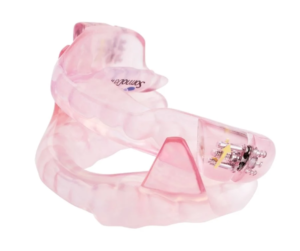 If you often feel sleepy during the day, it could be because your sleep aponea isn’t allowing you to get a deep, full night’s rest. Sleep aponea can also cause you to snore, and you may wake up in the morning with a dry mouth or a headache.
If you often feel sleepy during the day, it could be because your sleep aponea isn’t allowing you to get a deep, full night’s rest. Sleep aponea can also cause you to snore, and you may wake up in the morning with a dry mouth or a headache.
A Mandibular advancement device (MAD) are usually recommended to treat mild forms of sleep aponea, reducing the symptoms and effects by moving your jaw into a forward position while you sleep. This position will expand your airway, helping you breathe better. There are many forms of this device, and they work best when designed from a mould or scan of your mouth and custom fit specifically for your teeth and jaw. Ask your dental professional if they recommend a MAD for your individual needs, and if they do, they can have one custom made for you.
All dental procedures carry risks. The results of these treatment options will vary from patient to patient. Please speak with your dentist for an accurate explanation of what you could expect.
Implants
Dental implants are the restoration that most closely resembles a natural tooth and are usually the optimal tooth replacement option. An implant can be placed at the time a tooth is removed, or sometime later, depending on the clinical situation. An initial consultation will help your dentist find out what type of treatment is best for you, the specific stages of treatment that are needed to get the best result and to screen for any factors that could affect treatment. Like most treatment options, the success depends on a healthy environment, as well as other factors like good quality bone in the area.
A dental implant is placed in two stages. First, a titanium screw is placed within the jawbone (under local anaesthesia) and allowed to heal, through a process called osseointegration. The gum will heal in just a few days after the implant placement and the bone around the implant will then mature over the next 2-4 months. It can then be restored with a porcelain crown, which has the look, feel and functional ability of a natural tooth.
At Kenmore Dental Centre, we utilise the latest in 3D intraoral scanning technology and digital smile design software when treatment planning. Innovate software allows a digital scan of your teeth to be merged with your 3D cone beam x-ray scan to ensure guided, and precision placement of your implant. As a result, the functional and aesthetic outcome of the implant are more predictable.
All dental procedures carry risks. The results of this treatment will vary from patient to patient. Please speak with your dentist for an accurate explanation of what you could expect.
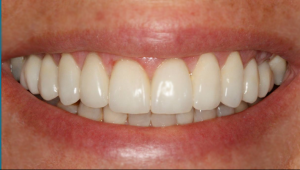
Cosmetic Dentistry
At Kenmore Dental Centre, we love working with patients to provide that life-changing improvement to their smile and self-confidence. Cosmetic dentistry is a broad term that can include a range of different dental services such as porcelain veneers, porcelain crowns, white fillings, laser gum reshaping, dental implants and teeth whitening. However, they all have a common purpose when relating to cosmetic dentistry in that they can all be used to improve the appearance of someone’s smile.
Dental Veneers can be made from either porcelain or composite resin; veneers are a custom crafted, very thin facing that is sealed permanently to the front of your teeth to enhance their aesthetic appeal. Veneers are increasingly becoming a popular treatment option for patients whose teeth are chipped, small, discoloured or have gaps between them.
As a veneer covers the entire front surface of your tooth, it is possible to change the colour, shape and size of your tooth to suit your aesthetic demands. Some people like square teeth, others like a more rounded shape to their teeth. The same goes for colour; some people want a bright white colour to their teeth whilst others like a more natural shade. You can determine all of these characteristics with your dentist through a process we call a ‘smile design’ and this can be “trialled” in your mouth before any treatment is commenced, to ensure you are happy with the predicted result.
All dental procedures carry risks. The results of these treatment options will vary from patient to patient. Please speak with your dentist for an accurate explanation of what you could expect.

Comprehensive Care
We would love to care for you and your family! We welcome new patients for both emergency and continuing dental care and are always aiming to make your visit as best as possible!
We believe that a thorough examination takes time. It is impossible to review your medical and dental history, examine your mouth and provide accurate advice in 15 minutes. Depending on the complexity of your mouth, please allow at least an hour for a comprehensive examination and hygiene appointment.
During this time your dentist will provide a:
- Comprehensive consultation and review of your dental history.
- Analysis of your medical history and discussion how this can affect your oral health.
- Full oral examination for tooth decay, gum disease, soft tissue lesions and muscular imbalance.
- Examination for TMJ problems causing headaches, neck pain, discomfort.
- Examination for disharmonious occlusion (bite).
- Examination of your airways and breathing and risk assessment for obstructive sleep apnoea.
- Analysis of low exposure digital x-rays.
- Intraoral digital photography to show you any areas of concern.
- A full discussion about your current state of oral health and choice in treatments for serious or chronic infections if required.
Our primary aim is prevention, so we will also take the time to discuss how your dietary and hygiene habits affect your dental health. Many people are surprised at how small changes to their home dental care can have a big impact on their overall dental health!
You will be provided with a plan and quotation if any treatment is required so that you may check your health fund rebate prior to your next visit.
Emergency Care
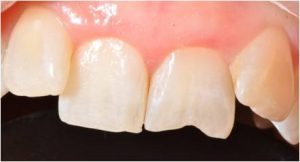
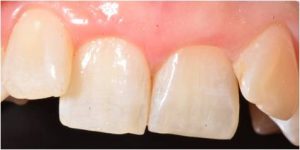
Despite the best prevention and care, emergencies will inevitably occur! Whether you are an existing patient or have never seen us before, we will do all that we can to deal with your emergency as a priority.
Dental emergencies can come in all different forms such as broken teeth, a toothache, or a lost crown. If you are in pain, our allocated daily emergency appointments enable us to see you as quickly as possible. These spaces are limited, so we recommend calling us as soon as possible after 8am to secure an appointment. If you are unsure if your situation is an emergency, our friendly reception staff can advise you how quickly you need to be seen.
Outside of business hours, Dr. Dominika Foster can take emergency calls on 0457 781 281.
All dental procedures carry risks. The results of emergency treatment will vary from patient to patient. Please speak with your dentist for an accurate explanation of what you could expect.
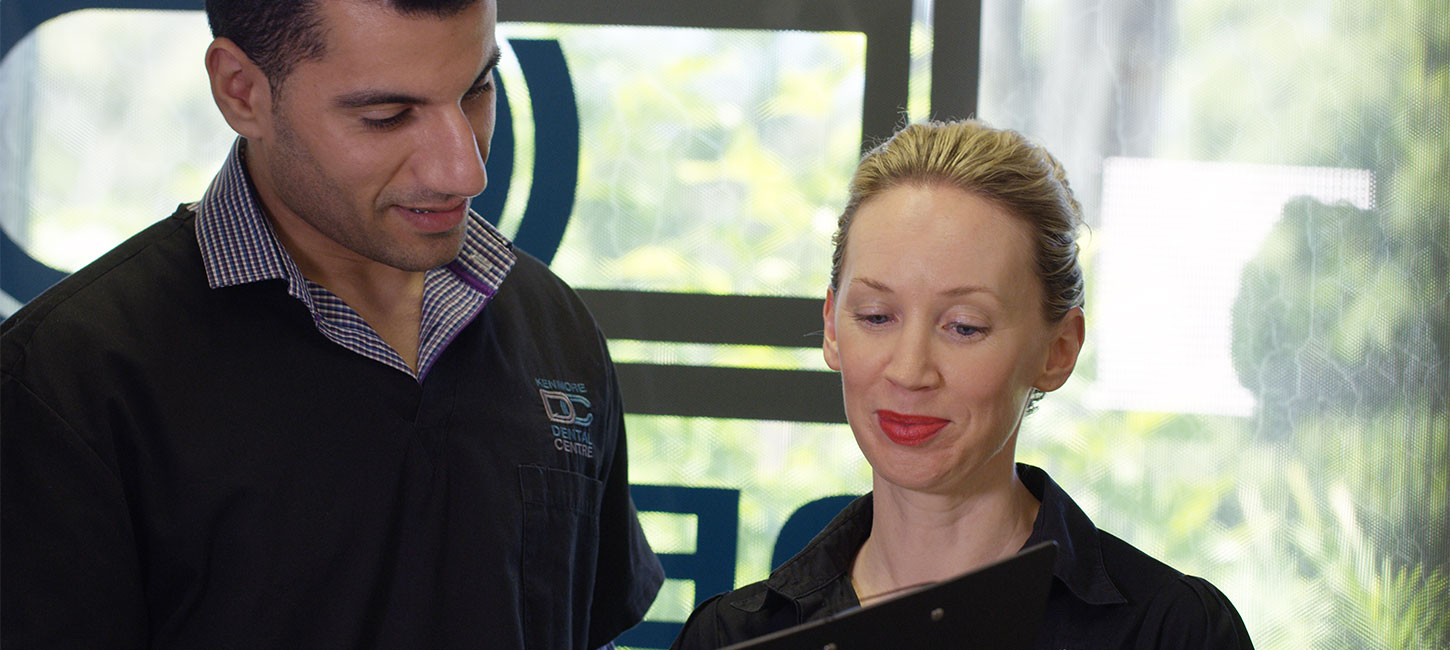
Amber Roylance
– Clinical Coordinator –
Amber Roylance joined the team at Kenmore Dental Centre in 2000. Prior to this she worked as a dental assistant for 3 years in her native New Zealand.
Amber enjoys seeing the familiar faces returning to the surgery year after year, especially all the children who she has seen grow into young adults.
Outside of work, Amber enjoys travelling the world and supporting her rugby union teams, the All Blacks and the Waikato Chiefs.
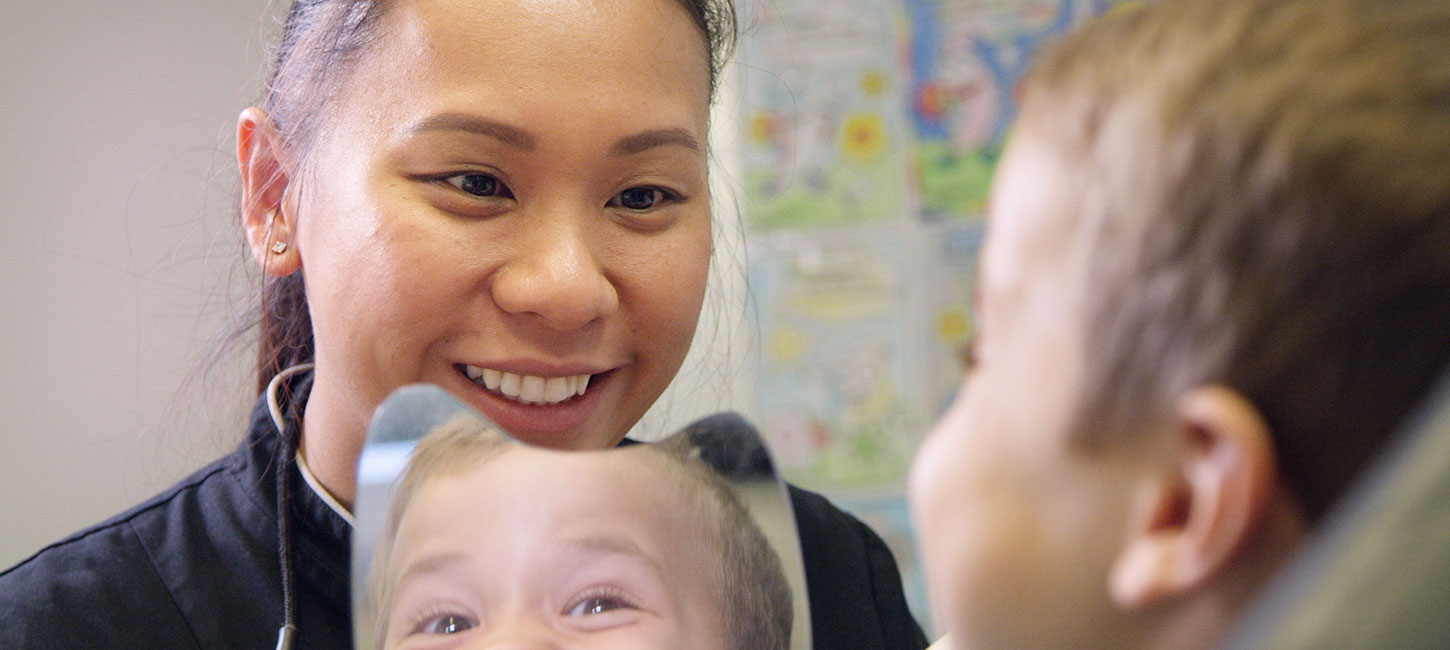
Emily Huynh
– Hygienist & Therapist –
Emily graduated from the University of Queensland with a Bachelor of Oral Health in 2010. Emily works closely with the dentists at Kenmore Dental Centre to improve patient’s oral health and awareness of preventative dentistry. As well as providing preventative care to patients of all ages, Emily also provides children with all of their preventative and restorative dentistry needs. Emily will endeavour to make your next dental visit as comfortable and pleasant as she can.
Emily is passionate about paediatric dentistry and ensuring that all children have a positive dental experience. Through education and motivation, Emily’s goals are to teach and encourage good oral hygiene techniques to maintain healthy gums and teeth and to develop good oral hygiene habits that will last their lifetime.
To maintain a high level of knowledge and clinical skills, Emily regularly attends continuing professional development seminars with a special focus on paediatric dentistry and periodontal diseases.
Emily is currently practicing Monday to Thursday, and will be on maternity leave in August 2024 to welcome her second daughter!
Dr. Luke Zhang
– Consulting Dentist –
Dr Luke graduated from the University of Queensland with first class Honours in 2020.
Luke is committed to providing dental care with the highest attention to detail. He is highly passionate about the artistic side of dentistry and his meticulous nature allows him to deliver the very best results for his patients in a gentle and calm environment.
Although he is proficient in all aspects of general dentistry, Luke has developed a special interest in aesthetic and complex reconstructive treatment. To provide more comprehensive care to his patients, he is currently completing his Masters in Aesthetic Dentistry at the prestigious King’s College London, one of the best dental schools worldwide.
Luke is also incredibly passionate about providing dental care to children and anxious patients. He aims to change the negative perceptions surrounding dentistry and show adults and children alike that dental care can happen in a light-hearted and friendly atmosphere.
Outside of the clinic, Luke is an avid explorer and adventurer. He enjoys hiking, scuba diving and mountaineering and loves to chat with his patients about recommendations for where to visit next.
Dr Luke is taking appointments on all weekdays for new and existing patients of the practice.

Dr. Dylan Fu
– Consulting Dentist –
Dr Dylan Fu graduated from the University of Queensland (Honours) and has practiced dentistry across many areas of South-East Queensland. Dylan began practice at Kenmore Dental Centre in 2022.
Patients of Dylan enjoy his caring nature and gentle touch; he does not rush and looks after their comfort. Dylan appreciates that everyone has different dental needs and prides himself on being able to offer the full range of treatment and options.
“I strongly believe in helping them make the best decision for themselves. I use intra-oral cameras and pictures to help them see what I see and explaining what is going on. Then I describe the options for my patients to choose for themselves.”
Dylan is committed to high quality dentistry. He has undertaken Professional Development training in Dental Implants, Root Canal Treatment, Crowns and Bridges and Aesthetic Dentistry.
Outside of dentistry, Dylan is a huge Formula 1 fan and a specialty coffee-holic. He can either be found on the edge of his sofa watching a race or tinkering with his home coffee bar.
Dr. Dylan is welcoming appointments on all weekdays for both new and existing patients of the practice.
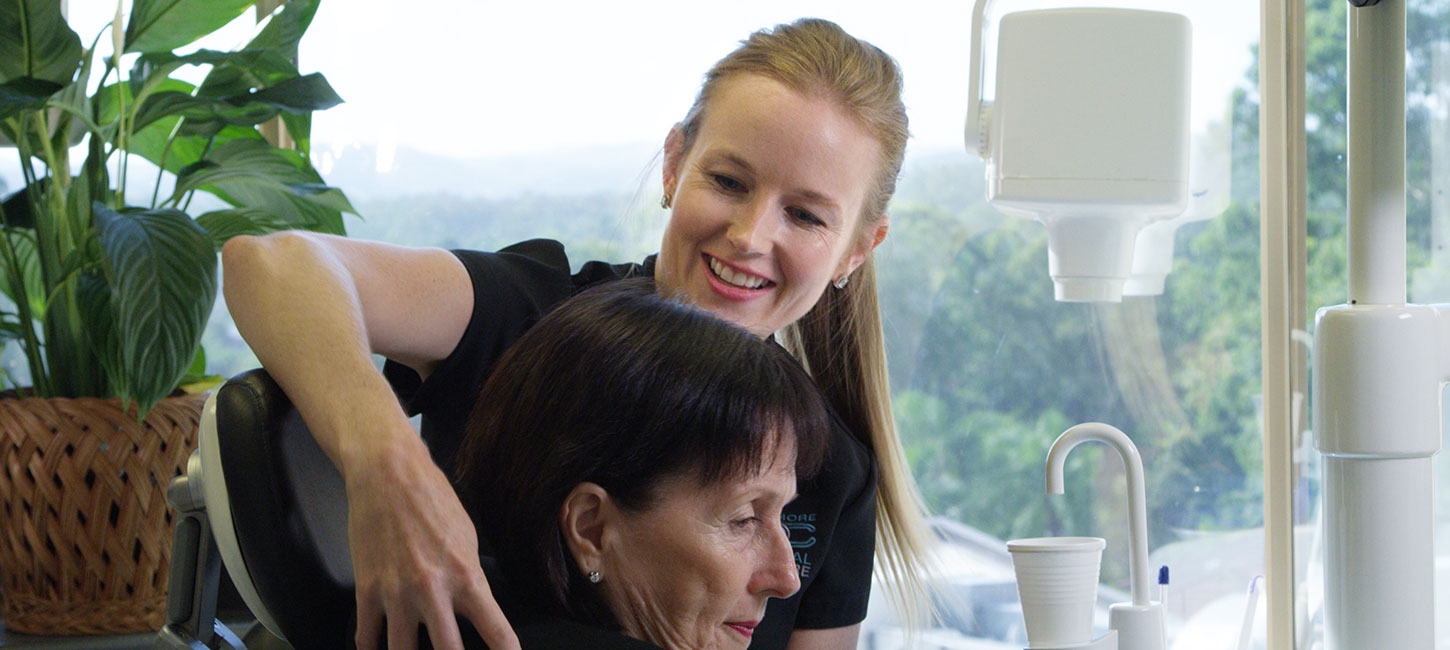
Dr. Lisa Wecker
– Consulting Dentist –
Dr. Lisa Wecker graduated from the University of Queensland, having completed her Bachelor of Dental Science degree with honours in 2007. Lisa has been practicing at Kenmore Dental Centre since 2013.
Lisa is committed to keeping up with developments in all areas of dentistry and is a member of the Australian Dental Association. She is well known for her gentle and caring nature and has a particular interest in preventive dentistry and children.
The majority of Lisa’s time outside of work is spent with her husband, Steve, who works for the Queensland Ambulance Service and Life Flight. Steve and Lisa have a small farm near Dayboro. Here they enjoy a quiet life riding horses and with their four cocker-spaniels Lucy, Bailey, Chloe and Luna. Lisa and Steve also enjoy exploring the great outdoors four wheel driving, camping and hiking.
Lisa is currently practicing Monday to Thursday.
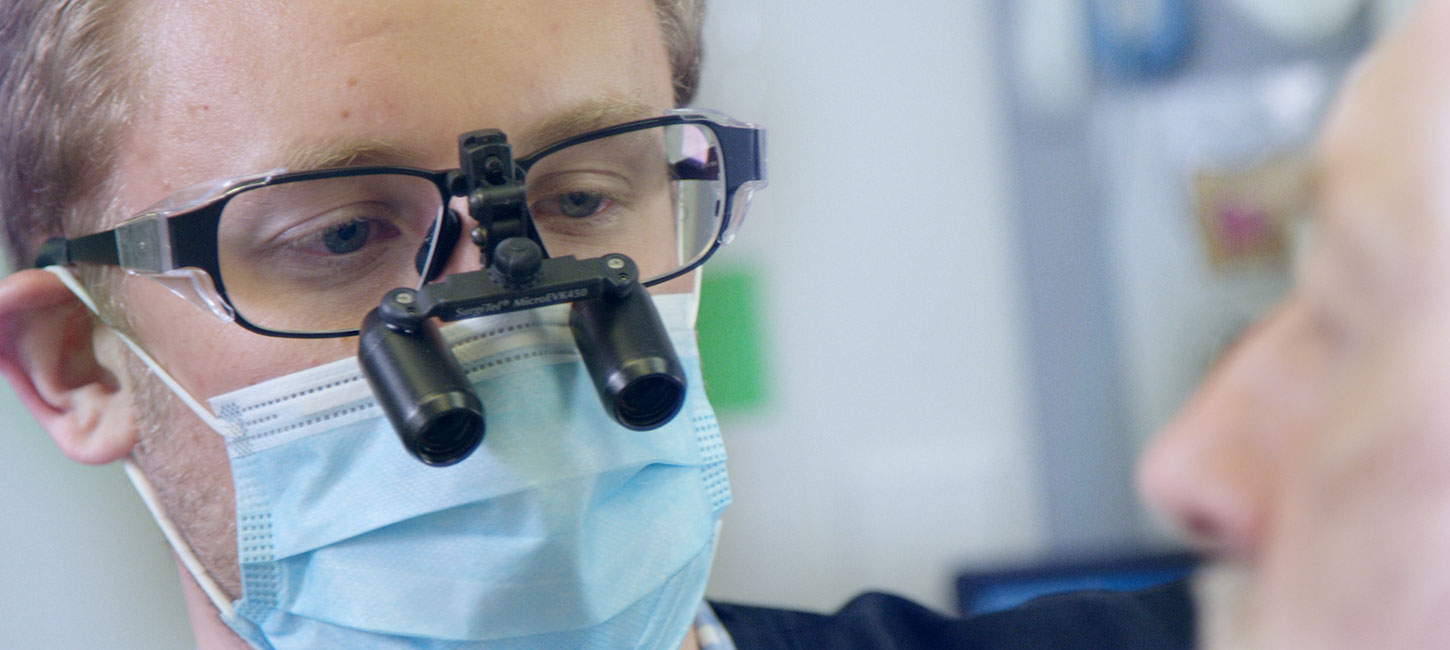
Dr. James Allen
– Dentist –
Dr. James Allen graduated from Guy’s, Kings and St. Thomas’ Dental Hospitals, of King’s College London in 2005. After working in a family practice in the south east of England, James and his wife, Dr. Emily Allen, moved to Australia in 2008.
James has undertaken professional development in a wide range of clinical aspects, however he has found his passion in aesthetic and reconstructive dentistry. In 2018, James completed a 3 year Master of Science (MSc) degree in Aesthetic Dentistry through King’s College London. This enables him to provide highly aesthetic and functional results for his patients through a minimally invasive approach. Treatment provided with this aspect of dentistry include: prevention and treatment of worn teeth, tooth coloured fillings and crowns, teeth whitening, veneers both in resin and porcelain, teeth replacement with dental implants, protection of teeth through splints and precision dentures.
James also has an interest in helping patients with the effects of sleep apnoea and snoring issues through construction of appliances that help maintain the airway at night. This can make a significant difference to patient’s health and well-being.
Outside of work, James is kept busy by his two young sons, Leo and Max. He also has a keen interest in photography and following English football.
James is currently practicing Monday, Wednesday, Thursday and Friday.
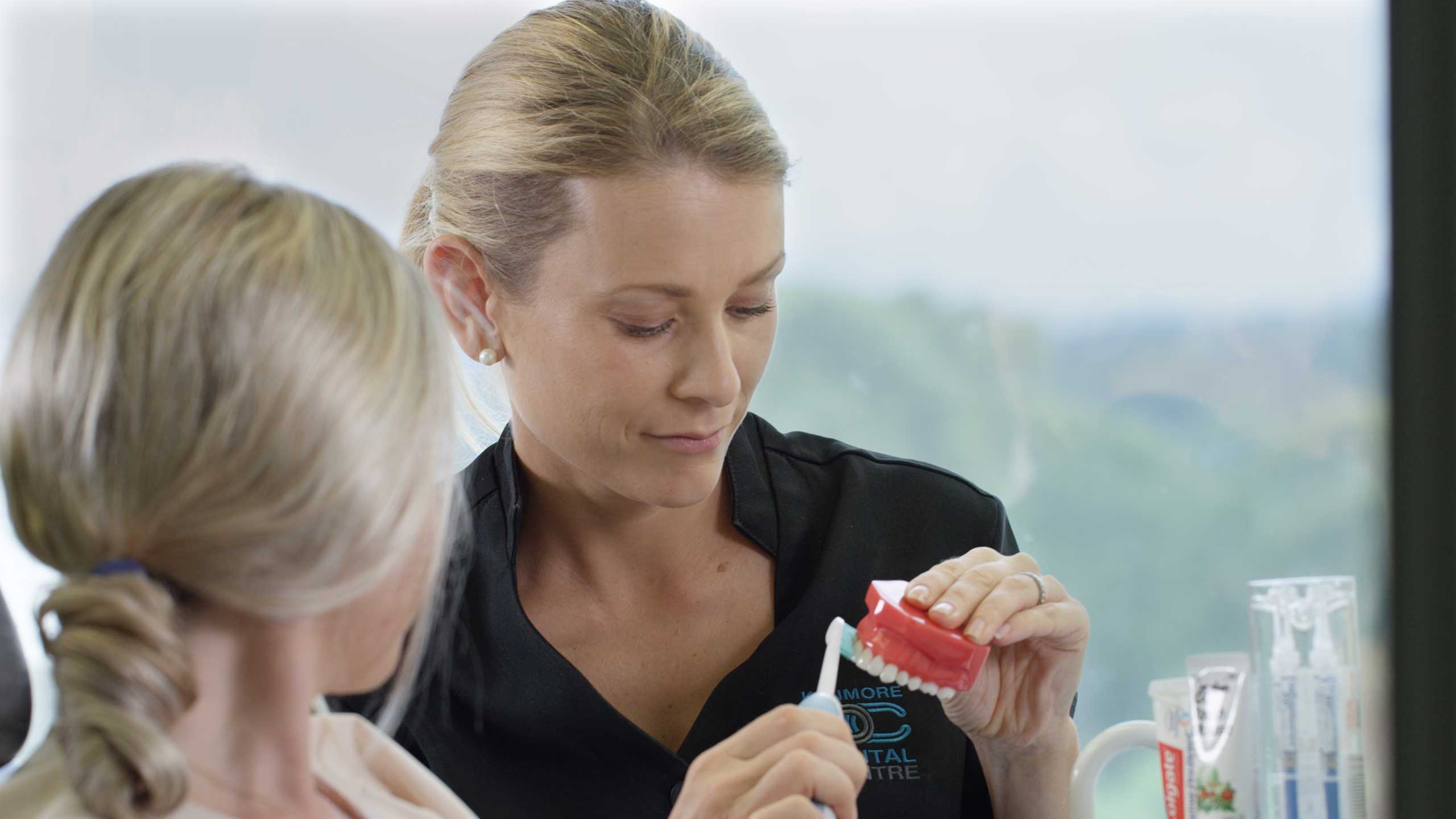
Dr. Dominika Foster
– Principal Dentist –
Dr. Dominika Foster is the Principal Dentist and owner of Kenmore Dental Centre. Dominika herself was raised in the western suburbs, and upon her graduation was thrilled to return home and join the previous owner (Dr. John Blake) in Kenmore.
Dr. Foster completed her Bachelor of Dental Science with First Class Honours at the University of Queensland in 2005. Throughout her degree, Dominika received numerous awards and was awarded a University Medal upon her graduation. Dominika enjoys furthering her knowledge through continuing education and clinical training and is particularly interested in the field of orthodontics. She has completed several intensive orthodontic training programs that allow her to provide her patients with options for improving the appearance and health of their smile.
Dr. Foster is a firm believer in preventative and minimal intervention dentistry. She actively supports dental health in the context of the whole body and enjoys nothing more than seeing her patients maintaining perfect oral health. Dominika practices her dentistry in a kind gentle manner and strives to make each patients treatment as comfortable and personalised as possible.
Dominika is a mother of two young boys, Ezra and Noah. She loves the joys and challenges of motherhood and is only practicing part-time at present so that she can spend some quality time at home with them. On her weekends, Dominika loves to spend the day at the beach with her husband Trent, their kids, and fox-terrier Max. She also has a keen interest in nutrition and health and loves to spend her free time keeping fit through running and yoga.
Dr Foster is currently practicing on a Monday and Tuesday.
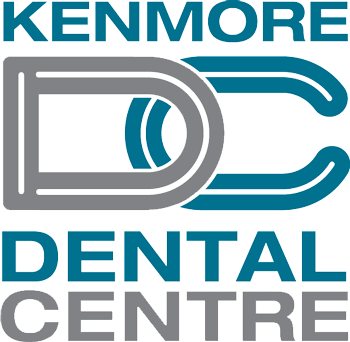



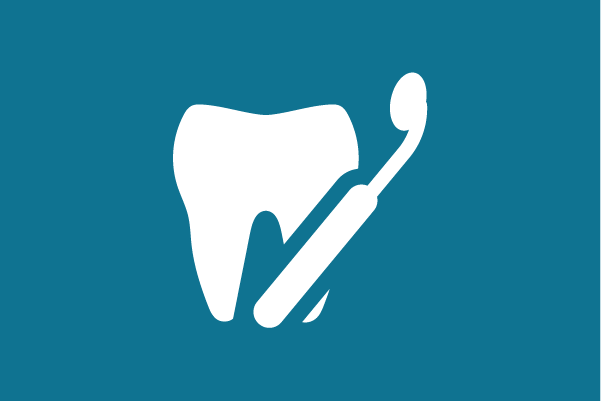
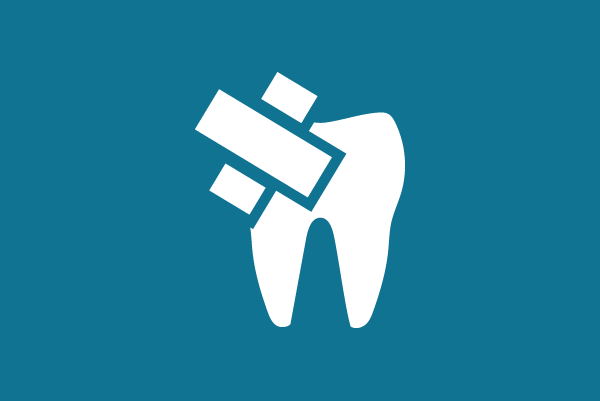
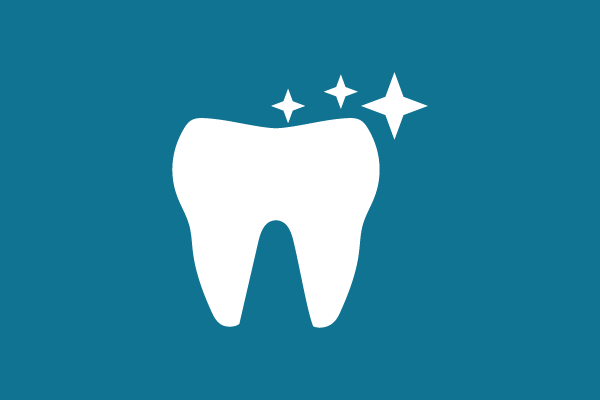
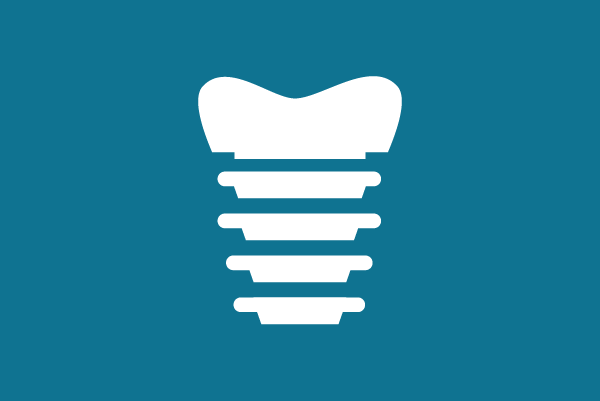
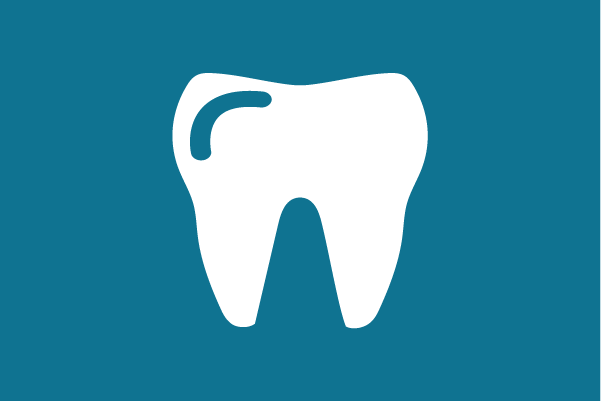
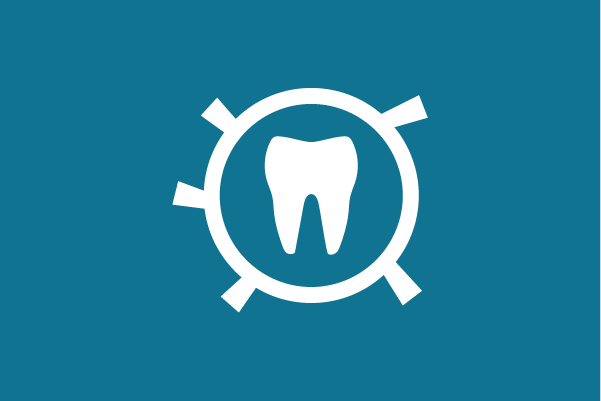
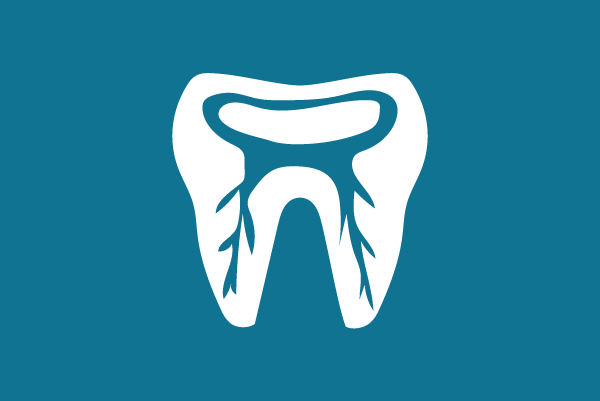
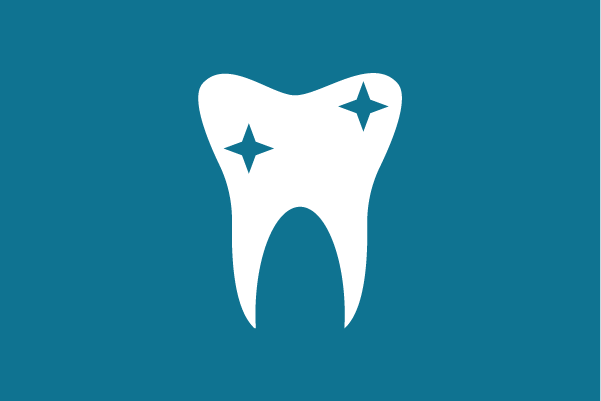
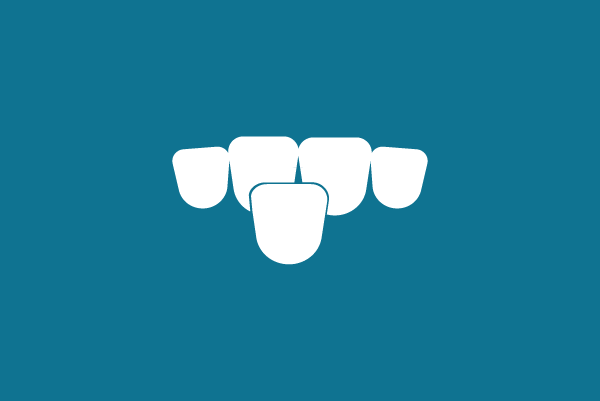


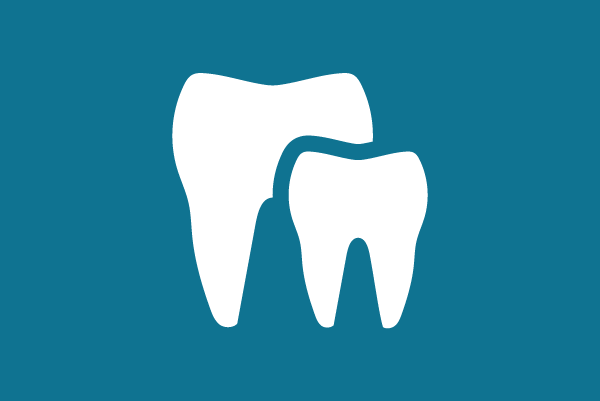
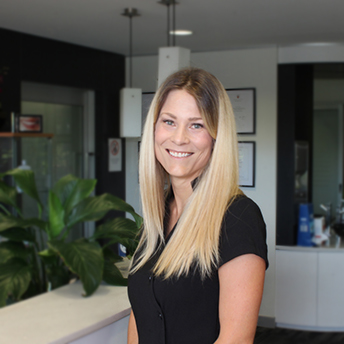
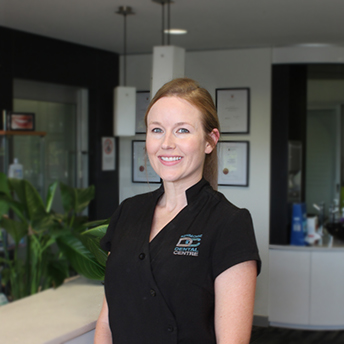
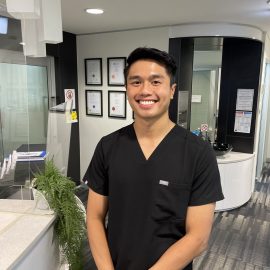
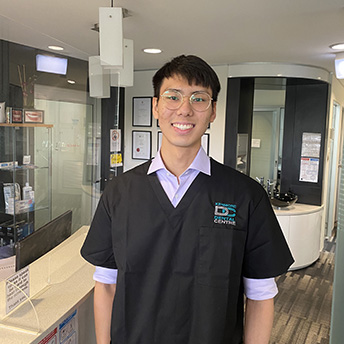

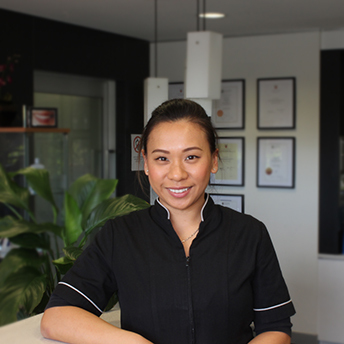
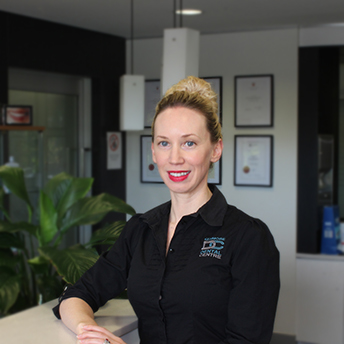


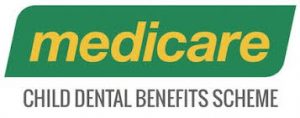
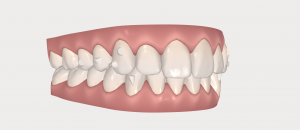

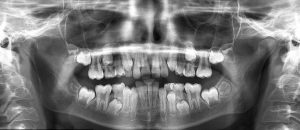
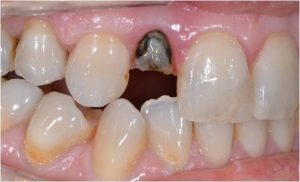
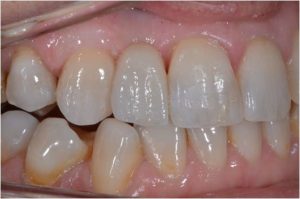

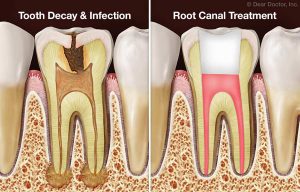
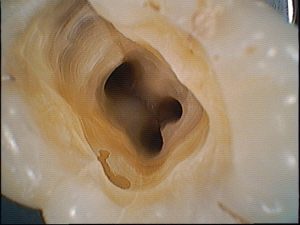
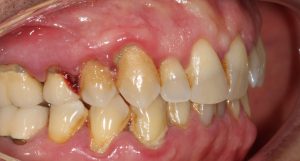

 If you often feel sleepy during the day, it could be because your sleep aponea isn’t allowing you to get a deep, full night’s rest. Sleep aponea can also cause you to snore, and you may wake up in the morning with a dry mouth or a headache.
If you often feel sleepy during the day, it could be because your sleep aponea isn’t allowing you to get a deep, full night’s rest. Sleep aponea can also cause you to snore, and you may wake up in the morning with a dry mouth or a headache.